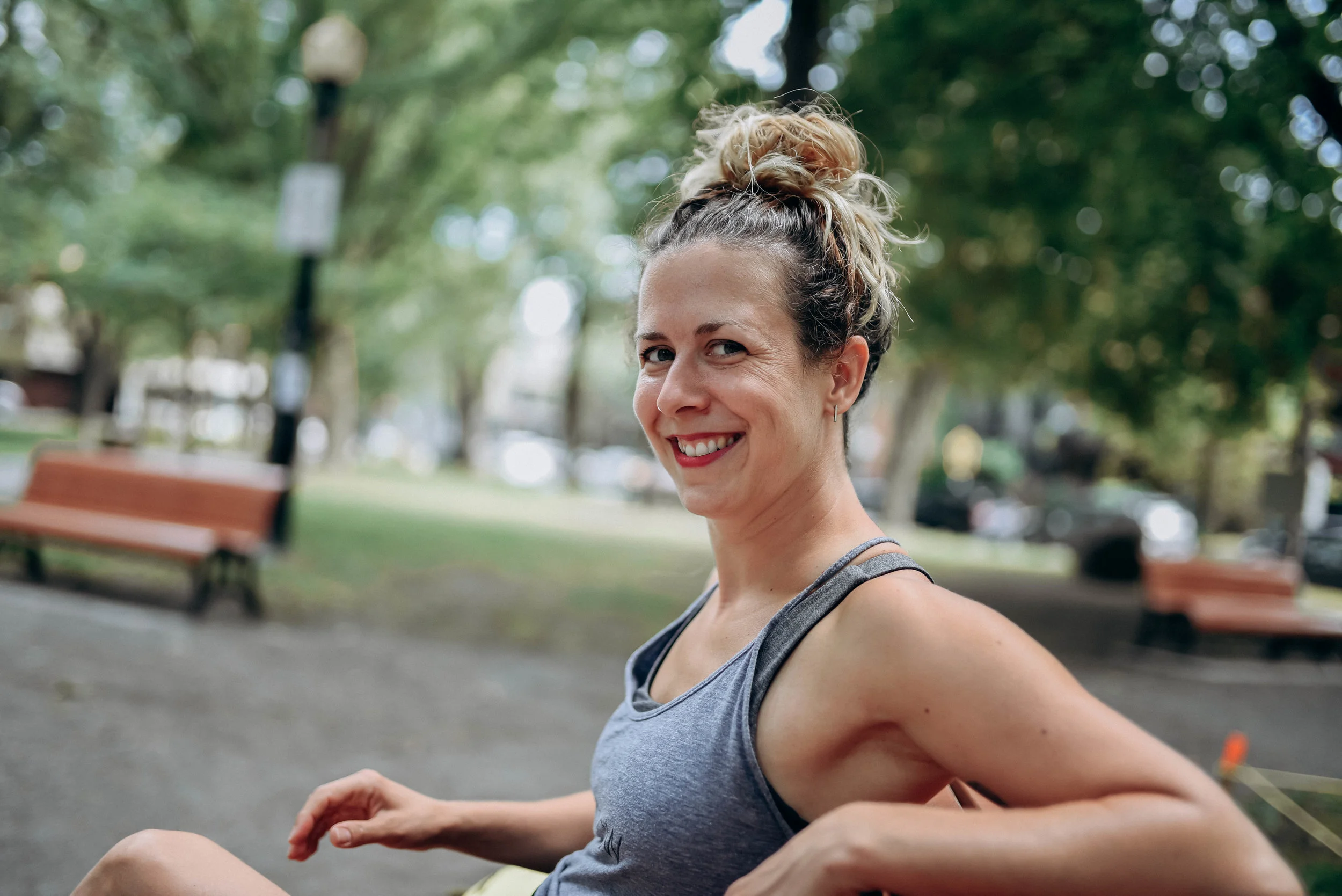Story #42 - Jennie, Montréal QC (CANADA)
I always wanted to have kids, something about dedicating yourself to someone else and caring in a meaningful way. I had been single for a while when I met the father of my children. I had this urgency to start having babies. Although it wasn’t as clear for him, he got on board, and I got pregnant very quickly. I had this idea that my life would be just as it was before I had a kid. I put a lot of pressure on myself to remain “the same.” I guess I’d seen a lot of mothers around me change and talk only about their kids. I was a hair stylist back then, and I worked until very late in my pregnancy. I labored for four days before my daughter was born. I was exhausted, but I finally gave birth very quickly on the fourth day. She was tiny, 4 pounds and 14 ounces. I was 36 weeks and 6 days, and although they never told me she was considered premature, they started the protocol without our consent. The first night a nurse came into the room to get her, and I was just like, “Whatever, I’m exhausted, take her.” But a couple of hours later I woke up and she wasn’t back. We found out they were poking her every three hours to check her glycemia. If she failed, they would supplement by gavage feeding. None of that had been explained to us. We fought really hard against the gavage, so they would still poke her, but then give her to me to feed. Of course, she associated the needles with the breast and never wanted to breastfeed ever again. She also ended up with jaundice. They got her into an incubator and I wasn’t allowed to hold her or to nurse anymore. I believe the “risk zero” doesn't exist, even at the hospital. Parents should be part of the decision process when it comes to their child. To go through a medical battle like this one when you’re not used to it, it was exhausting.
The fact that she never breastfed felt like a failure. It was hard physically, hormonally, and emotionally. It was a battle: every feeding took me hours, between pumping, sterilizing everything, and feeding her. I wasn’t sleeping much. I did it for four months, then I think I went through postpartum depression. My hormones dropped, and I was sleep-deprived. She was starting to interact more, but it's like if I wasn’t there anymore. I wasn’t receptive to her presence. People tell you, “Oh I know it’s hard but those first months are fun! She’s so beautiful! You must love her so much!” but in fact, I was so bored. I felt like I was in jail. Around the same time I stopped pumping, I went back to work, one day a week. My partner would stay with her, and I think it helped them to bond quickly. He’s a great dad. I believe it also helped me to experience motherhood more healthily. I understood I wasn’t alone in there and I didn't have the sole responsibility for our child. I tried really hard to slow down and put in perspective what it meant to become a mother, to ask myself what I wanted to pass on to my daughter. Before I had her, I was very into “performing.” I didn’t mind working for 10 hours straight without peeing and barely eating, then going back home to a bowl of ramen. But when you have kids, it’s different. They might get sick or get up early in the morning. They need a parent who is available, not just physically, but for their emotional needs too. Suddenly, I had this clash of values with myself but also with work. When it became clear that I wanted another child, I had to listen to my heart and not my head. So, we made another one, but I knew this time around there would be limitations and that I'd have to respect them.
My pregnancy went well. I got to 40 weeks this time and I was able to have him at a birth center with a midwife. When he came out, it took him a while to become pink. I quickly realized that he had a very rapid breathing. It could have been due to the birth, but after 24 hours we were transferred to the Jewish [Hospital, in Montreal.] As with our daughter, we were put in the ICU. They tested him, and we thought that everything would be fine. The staff was very kind and competent. Our doctor described everything, and when we were recusant about the interventions, she took the time to explain. For us, there was no real problem (he was just breathing quickly.) At the same time - and despite the lack of evidence - she opened the door to “something might be wrong.” She offered to investigate, but because our son was stable and, ultimately, doing fine, they released us. It was after the fact that we began to think that something was indeed wrong. When he turned two months old, he had his first fever. We went straight to the ER and they kept him under observation for a day. Then it happened again... and again. For months, the fevers kept coming and going. We would go to the hospital where they'd monitor him for a couple of hours, then we were sent back home because the tests all came back negative. At 5 months old, the attacks became worse, and we met with multiple doctors – some competent, many not – we did research on allergies, infections, but no one had a diagnostic for the recurrent fevers. Again, everybody tells you “Wait until he’s six months old, wait until he’s seven…” but what about now! Every crisis was the same: fevers, white tongue, sores, no appetite, and convulsions at night. We got used to it and had a protocol put in place at home, alternating between Tylenol and Advil. After a while, we didn’t go to the hospital anymore. We would leave with no answer and exhausted, so it wasn't worth it. Those crises, they lasted for two years.
As a parent of a sick child, you get to the point where people tell you just to give up and to stop looking, but you can’t. To give up means to abandon him. When he started to have blood in his stools on top of the fevers, we made the decision to leave the hospital where he had been treated for the past two years and headed to the Children’s Hospital. They kept us there for one week. All-hands-on-deck. Their philosophy was so different: they were very interested in our family history and not just his. They asked us how we felt, and what we did to manage the attacks. We met multiple times with multiple specialists so they could interpret the situation from different angles. It was the first time in two years I felt somebody took the time to listen. They let us go after one week telling us that they still didn’t know what our son had, but that they’d keep investigating. During our stay, he had been getting better, and we kept giving him what they’d prescribed: the fevers didn’t disappear, but they were less intense, and there was no more blood in his stools. Many months went by before we found out what he had: it turns out my partner and I each have one genetic mutation, and our son inherited of both. He doesn’t produce mevalonate kinase, which then causes inflammation. There is one treatment: an injection every other month that isn’t covered by the RAMQ [Universal Health Insurance] and costs $205 000 per year. We filled a claim for an exception, and it was approved. We were lucky. Two days after his first injection, our life changed. The swelling went away, he started to eat, and even to argue with us! After the diagnostic, I went to get help. Before that, nobody believed us, so I didn’t feel entitled to seek help. I’m seeing a therapist, and our son is now three. It brought up a lot of questions about what it means to be a mother, and specifically a mother of a sick child. Because to be caring you have to be self-caring first. Right now, I'm trying to heal as a person, as a couple, and as a family. We were able to fight through it, but we were in a survivor mode for so long... I'm not all about performance anymore. I'm about balance.



